
During the ongoing hearing of the Presidential Reference concerning the powers of Governors and timelines for granting assent to Bills, the Supreme Court on Tuesday voiced serious reservations about an interpretation of Article 200 of the Constitution which suggests that Governors possess an unfettered right to “withhold” assent without returning the Bill to the respective State Legislature.
The Constitution Bench, comprising Chief Justice of India BR Gavai, and Justices Surya Kant, Vikram Nath, PS Narasimha, and AS Chandurkar, observed that if such a reading of Article 200 were accepted, Governors could even withhold money bills, despite the constitutional mandate that they ordinarily must be approved. This, the bench remarked, would create a “problematic” scenario undermining the legislative process.
Justice Narasimha, engaging with arguments by Senior Advocate Harish Salve (appearing for the State of Maharashtra), highlighted the Union Government’s contention that the Governor’s power to withhold assent under Article 200(1) stands independently and is not tied to the proviso which allows returning a Bill for reconsideration. According to the Union, withholding assent results in the Bill lapsing—effectively giving Governors a veto power.
Justice Narasimha cautioned against this view:
“If an independent power to withhold is recognized, then even a money bill could be blocked at the outset. That interpretation raises serious constitutional issues.”
Salve, however, argued that the plain language of Article 200 supports withholding as a distinct, fourth option, besides granting assent, returning a Bill, or reserving it for the President. He asserted that adding implied restrictions would distort the constitutional scheme.
The bench repeatedly pressed Salve on reconciling this interpretation with the safeguard for money bills. Justice Narasimha asked how it could be permissible for a Governor to outrightly reject a money bill, when the proviso explicitly prevents its return for reconsideration.
Solicitor General Tushar Mehta intervened, pointing to Article 207, which requires the Governor’s recommendation for introducing a money bill. Therefore, he argued, the question of a Governor later withholding assent does not arise.
Salve responded with a hypothetical situation: if the final form of the money bill passed by the legislature deviated from the Governor’s recommended version, the Governor might still withhold assent. He contended that since Article 207 already provides safeguards, the framers may not have seen the need to limit the withholding option for money bills.
Salve further emphasized that Article 200 imposes no time limits for the Governor to act on Bills, arguing that political processes often take time and judicially imposed deadlines would be impractical. He noted that the Governor, being appointed by the President and holding office at the Union’s pleasure, acts as a communication link between the Union and the States.
He stressed that courts cannot question the reasons behind the Governor’s decision to withhold assent:
“There are no judicially manageable standards to review such discretion. To ask why the Governor withheld assent is impermissible.”
When the CJI asked if the Court could direct the Governor to disclose reasons for withholding, Salve firmly replied, “No.”
Senior Advocates Neeraj Kishan Kaul (for Madhya Pradesh) and Maninder Singh (for Rajasthan) echoed Salve’s submissions, siding with the Union’s interpretation that withholding is a constitutionally valid fourth option.
The matter is being heard day-to-day, with the Court refraining from making observations on earlier rulings concerning Governors of Tamil Nadu and Punjab, but focusing instead on the broader constitutional interpretation of Article 200.
Previous hearings have already raised questions on whether Governors indefinitely delaying assent could paralyze legislatures and whether courts could fix timelines. The current proceedings continue to test the balance between executive discretion and legislative supremacy within India’s constitutional framework.
Website designed, developed and maintained by webexy